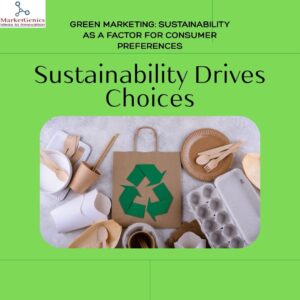
Green Marketing: Sustainability as a Driving Force to Consumers
“It is no longer selling an item, it is about purpose.”
Introduction: Green is the New Mainstream
The concept of sustainability has grown exponentially, in a world facing an age of climate change, resource depletion, and ethical consumption, one element is becoming less of a want and more of a necessity in consumer purchase behaviour, sustainability. What used to be a differentiator now is a bare minimal requirement. Customers are getting smarter and socially aware, and as a result they now demand that brands be held responsible not only to what they are selling, but also its base of production and the nature in which it was marketed and its life cycle. That is where green marketing comes, not just as a means of 'selling'(marketing), but as a philosophy that integrates the purpose and the profit. Transparency, eco-innovation, and climate integrity are the most promising source of competitive advantage companies are discovering to remain competitive.
Consumer Preferences in 2024-2025 What the Data Says
Recent global studies reflect a dramatic shift:
- According to MarketGenics, 85% of global consumers say environmental impact is a key consideration in what they buy.
- 73% of customers say they’re willing to pay more for a product that’s sustainably produced.
- Among Gen Z and millennials, sustainability ranks as a top 3 brand loyalty factor, outweighing even price in some markets.
- Despite global inflation, consumers paid an average 9.7% premium for eco-certified products in 2024.
Consumer assurance will depend on documentation rather than conjecture. Companies that convey indecipherable and unquantifiable sustainability messages run the risk of loss of credibility, and customers.
What about Green Marketing: It Is More Than Eco-Labels
Green marketing now goes beyond use of recycled paper and incorporation of leaf motifs to logos. It entails an entire story thoroughly ingrained in sustainability of products, packaging, pricing, promotion and follow-up interventions. The Main Strategies Are
Key Strategies Include:
- Eco-Innovative Products: R&D-driven design that minimizes waste, emissions, and toxicity.
- Life Cycle Messaging: Communicating how products are made, sourced, used, and disposed.
- Digital Transparency Tools: QR codes, blockchain tags, and impact calculators.
- Cause Marketing: Aligning with environmental NGOs or circular economy initiatives.
- Sustainable Loyalty Programs: Rewarding consumers for recycling or choosing low-impact options.
Marketing Highlights with examples
- Patagonia: Embeds activism in branding, recently giving all company profits to climate causes.
- Unilever: Brands like Dove and Hellmann’s now carry carbon labels and climate pledges.
- Adidas: Introduced fully recyclable shoes and plant-based materials in its “Futurecraft” range.
- Coca-Cola: Launched returnable glass bottles and rolled out trials for plant-based packaging in Europe.
Such brands do not only sell, they educate, empower, and also engage making consumers more loyal to them, and reducing environmental impact.
Major Challenges to Your Green Marketers
- Affordability vs Accessibility
Even though consumers would like to spend money in environmentally sustainable companies, still, price is the main deterrent. MarketGenics' pricing elasticity analysis shows that 54% of consumers globally consider cost a barrier to choosing green.
- Greenwashing & Mistrust
A significant proportion of consumers doubt environmental claims. According to the EU, in excess of 53 percent of environmentally related claims are inaccurate or cannot be proven, making the introduction of the Green Claims Directive a regulation that created the necessity of scientific backing to the claims made about sustainability.
3. Label illiteracy
As per a survey in the UK only 25% of consumers know what words like net-zero, biodegradable, or carbon neutral mean.
4. Regulatory Complexity
There are various sustainability standards enforced in different countries With the FTC Green Guides in the U.S. the EU Ecodesign Directive, there is a constant struggle to ensure that brand campaigns are put into practice in a way that does not violate local law.
How MarketGenics Supports Smarter Green Marketing
MarketGenics helps brands back their sustainability storytelling with verified insights, audience data, and regulatory alignment. It serves as the intelligence partner that de-risks marketing and enhances brand value through trust and transparency.
MarketGenics’ Solutions:
Analyzes countries and regions for consumer sustainability sentiment, label recognition, and green policy enforcement. Helps brands localize campaigns for maximum relevance.
Predicts how much additional consumers in various demographics will pay for green products, allowing for improved pricing.
- Eco-Claim Verification Toolkit
Validates the truth and believability of brand claims, measures threats of greenwashing, regulatory non-compliance, and consumer pushback.
- Engagement Benchmarking Campaign
Compares green marketing campaigns across industries using metrics like conversion rate, time on page, and post-purchase sentiment.
Comprehensively researches and constantly updates labeling laws and eco-certifications standards in different jurisdictions to keep brands ahead of the game and compliance.
Call to Action
- Marketers: Audit your green campaigns. Are they backed by credible data or just design flair?
- Business Leaders: Invest in sustainability not just as CSR—but as core strategy.
- Policy Makers: Harmonize sustainability labeling standards to reduce greenwashing.
- Consumers: Keep questioning claims. Your purchasing power drives brand behaviour.
Let your next campaign not just sell—but lead.
Conclusion: Profit with Purpose is the Future
Sustainability is not a marketing tool, but it is a business necessity. The modern consumer is not content to consume products and brands that merely look good but instead is the consumer who desires that brands and products must do the good. And with billions of dollars being redirected toward ESG funds, the alignment of marketing with genuine sustainability efforts is no longer optional, it’s existential.
MarketGenics ensures that brands don’t just speak green, they think green, plan green, and grow green. With advanced data, consumer insight modeling, and regulatory foresight, MarketGenics empowers marketers to transform purpose into performance.
“Green marketing, done right, builds more than revenue—it builds reputation, resilience, and relevance.”
